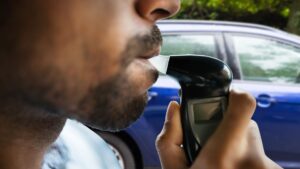 How to Beat a DWI Charge in New York
How to Beat a DWI Charge in New York
You blow a 0.06% on the breathalyzer and think you’re in the clear because everyone knows the legal limit is 0.08%. But the officer still arrests you for DWAI in New York, leaving you confused about what just happened. Many people don’t realize that New York has multiple categories of impaired driving charges, each with different blood alcohol thresholds and penalties.
The difference between DWI and DWAI isn’t just a legal technicality. This distinction can elevate an offense from a simple traffic violation to a misdemeanor, turning a fine into potential jail time, and extending a license suspension from limited driving privileges to several months of revocation.
Impaired Driving Categories
New York divides impaired driving into a few distinct categories. Each category has specific blood alcohol content requirements and corresponding penalties that escalate based on the level of impairment.
Driving While Intoxicated (DWI)
This is the most common charge people think about when they hear the words drunk driving. DWI requires either a blood alcohol content of 0.08% or higher, or proof that alcohol impaired your ability to operate a vehicle to a substantial degree. “Substantial impairment” means more than slight impairment but less than complete incapacitation.
If going by the substantial impairment standard, the prosecutor must present evidence other than the BAC reading. They typically rely on officer observations of your driving behavior, performance on field sobriety tests, and physical symptoms like slurred speech or coordination problems.
Driving While Ability Impaired by Alcohol (DWAI)
DWAI covers the gray area between sober and legally intoxicated. This charge applies when your BAC falls between 0.05% and 0.07%, or when prosecutors can prove your ability was impaired to any extent by alcohol consumption.
DWAI has a lower threshold. Prosecutors need only show that alcohol impaired your ability to operate a vehicle to any extent, or that your BAC was between 0.05% and 0.07%.
This “to any extent” standard means that even minor impairment can support a DWAI charge. Prosecutors might use evidence like the smell of alcohol on your breath, bloodshot eyes, or slight difficulties with coordination to meet this lower burden.
Aggravated DWI
The most serious category kicks in when your BAC reaches 0.18% or higher. New York treats this as a separate offense with enhanced penalties that reflect your extreme level of intoxication.
The key difference is the level of impairment required for each charge. DWI requires substantial impairment, while DWAI only necessitates some impairment. This distinction impacts both the prosecution’s burden of proof and the potential consequences you may face.
Understanding New York DWAI Penalties
The consequences of a DWAI conviction are significantly less severe than those for a DWI, but a conviction still carries serious repercussions. Penalties for both offenses escalate with each subsequent violation.
A first-time DWAI conviction is classified as a traffic infraction. It is punishable by a fine between $300 and $500, a potential jail sentence of up to 15 days, and a 90-day license suspension.
A first-time DWI conviction is a criminal misdemeanor, which means it will result in a permanent criminal record. This charge comes with more serious penalties, including:
- A fine of $500 to $1,000;
- Up to one year in jail;
- A minimum six-month license revocation;
- Installation of an Ignition Interlock Device (IID) on any vehicle you own or operate for at least six months; and
- A Driver Responsibility Assessment (DRA) fee of $250 per year for three years.
While a DWAI is not a criminal offense, it still counts as a prior offense if you are charged with a subsequent DWI. The law views any alcohol-related driving offense as a pattern of behavior that can lead to more serious charges.
How We Get Results in DWI and DWAI Cases
Understanding the distinction between DWI vs. DWAI requires attorneys who grasp each charge’s legal nuances and practical implications. At Greenspan & Greenspan, we have managed hundreds of impaired driving cases, which have given us valuable insights into prosecution strategies and practical defense approaches for both charges.
We have successfully negotiated DWI reductions to DWAI, challenged the evidence supporting impairment charges, and achieved dismissals due to constitutional violations or procedural errors. Our track record demonstrates our understanding of how prosecutors handle DWI compared to DWAI cases.
We evaluate each case individually and develop strategies tailored to the specific charges and evidence involved, which sets us apart. We understand that a one-size-fits-all approach doesn’t work when the legal standards and potential consequences vary significantly between charge types.
Protect Your Future Regardless of the Charge
Facing DWI or DWAI charges can truly turn your life upside down. The fallout, from a suspended license to soaring insurance rates and a criminal record, can last well after your day in court. Building your defense early increases the likelihood of a favorable outcome that safeguards your driving privileges, record, and livelihood.
Frequently Asked Questions
Can a DWI Charge be Reduced to a DWAI?
Negotiating a plea to a DWAI in a DWI case is often possible. This is a common strategy for defense attorneys, as a DWAI charge carries significantly lower fines, a shorter license suspension, and, most importantly, is a traffic infraction rather than a criminal conviction.
Does DWAI Show Up on Background Checks?
DWAI typically appears as a traffic violation rather than a criminal conviction, so it may not appear on standard criminal background checks. However, it will appear on driving record checks. It may still affect employment opportunities that require driving or involve transportation industry positions.
How Does a DWAI Affect My Commercial Driver’s License?
Any alcohol-related driving conviction can result in disqualification from commercial driving, even if the violation occurred while driving a personal vehicle. Commercial drivers face federal disqualification rules that are often stricter than state penalties.
Can I Get a Conditional License After a DWAI Conviction?
DWAI convictions typically make you eligible for conditional licenses sooner than DWI convictions. The 90-day suspension period for first-offense DWAI is shorter than DWI suspension periods, and the requirements for obtaining conditional licenses are often less restrictive.
Resources







